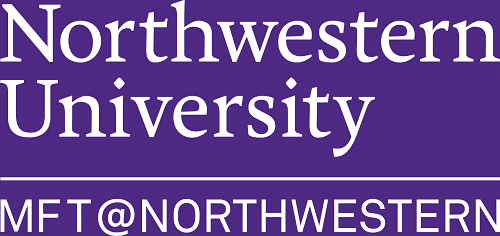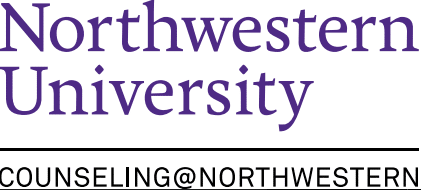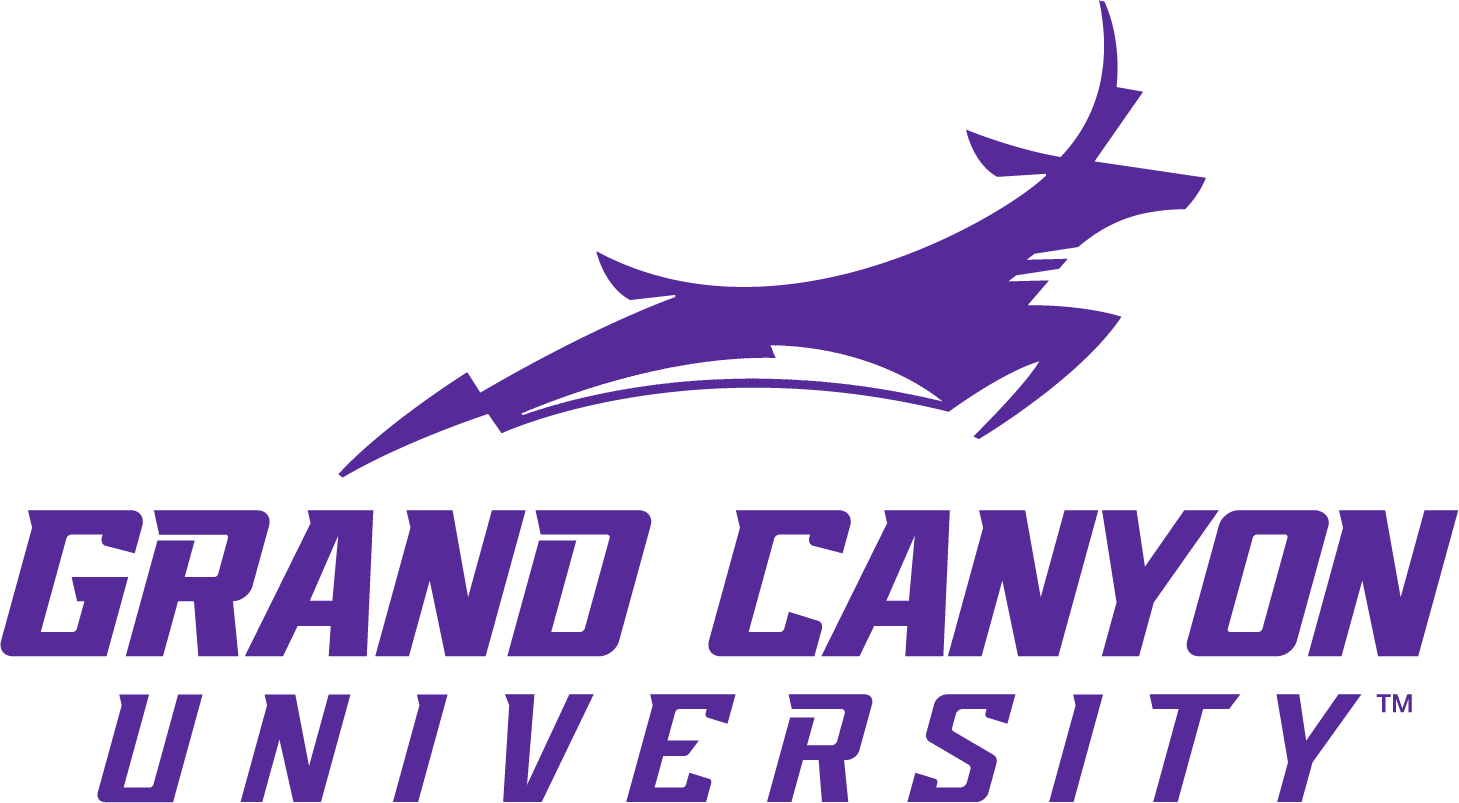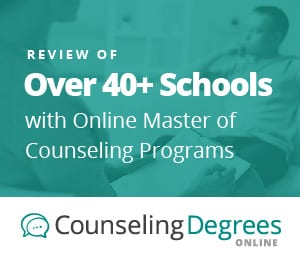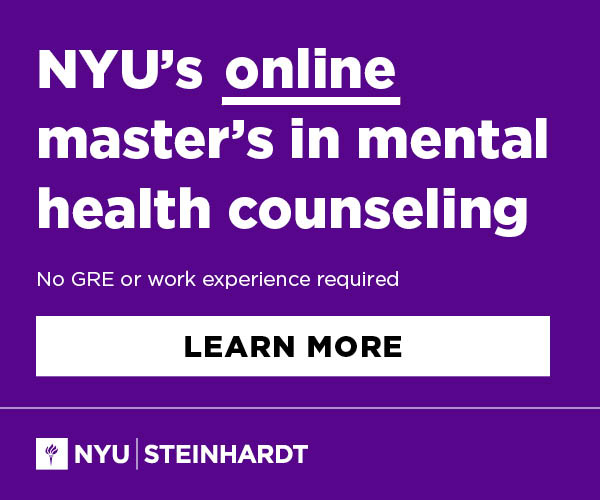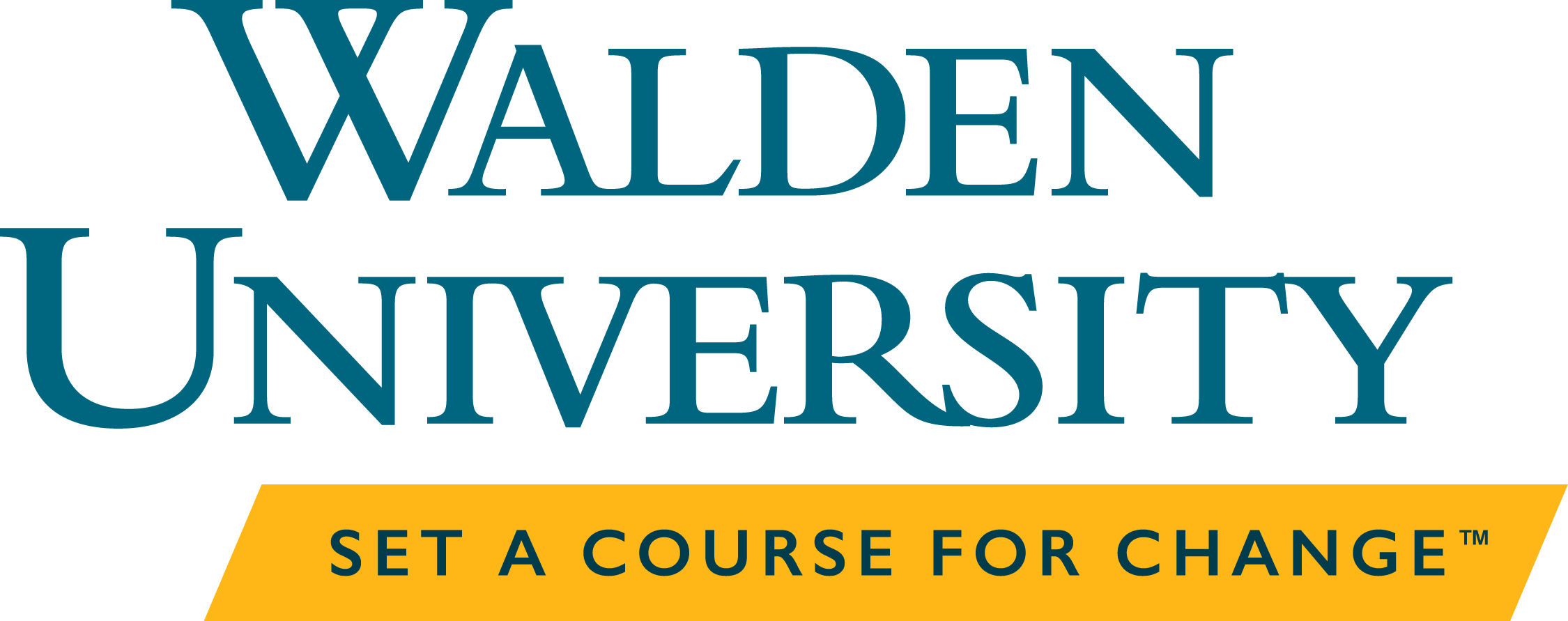 Walden University : MS in Psychology (HLC Accredited)
Walden University : MS in Psychology (HLC Accredited) Walden University : PhD in Counselor Education and Supervision, Clinical Mental Health Counseling (HLC Accredited)
Walden University : PhD in Counselor Education and Supervision, Clinical Mental Health Counseling (HLC Accredited) Walden University : MS in Clinical Mental Health Counseling (CACREP Accredited, six specializations to choose from)
Walden University : MS in Clinical Mental Health Counseling (CACREP Accredited, six specializations to choose from) Walden University : MS in School Counseling (CACREP Accredited)
Walden University : MS in School Counseling (CACREP Accredited) Walden University : MS in Marriage, Couple, and Family Counseling (CACREP Accredited)
Walden University : MS in Marriage, Couple, and Family Counseling (CACREP Accredited) Walden University : MS Dual Degree in Clinical Mental Health Counseling and School Counseling (CACREP Accredited, six specializations to choose from)
Walden University : MS Dual Degree in Clinical Mental Health Counseling and School Counseling (CACREP Accredited, six specializations to choose from) Walden University : PhD in Clinical Psychology (HLC Accredited)
Walden University : PhD in Clinical Psychology (HLC Accredited) Walden University : Master of Social Work (MSW) (CSWE Accredited)
Walden University : Master of Social Work (MSW) (CSWE Accredited) Walden University : PhD in Counselor Education and Supervision, Addiction Counseling (HLC Accredited)
Walden University : PhD in Counselor Education and Supervision, Addiction Counseling (HLC Accredited)Scholarships for Master's in Counseling Students
National scholarships
Several national organizations offer funding open to graduate counseling students across the country. These awards typically target students with strong academic records, clear professional goals, and a demonstrated commitment to the counseling profession.
- American Counseling Association (ACA) Awards — ACA recognizes member excellence through a national awards program. Within it, the Graduate Student Awards of Excellence honor emerging counselors and offer scholarship opportunities for groups and individuals. Student awards include the Courtland C. Lee Multicultural Excellence Scholarship Award, the Glen E. Hubele National Graduate Student Award, and the Graduate Student Ethics Award (master’s).
- NBCC Foundation Scholarships — master’s-level scholarships supporting students committed to serving underserved communities; see the Minority Fellowship Program (MFP) for additional fellowships.
- American Psychological Foundation Graduate Funding — funding opportunities primarily for psychology graduate students; some awards may fit counseling psychology students—review eligibility details.
- The Melanie Foundation Scholarship — annual $2,500 scholarship for graduate students in mental-health fields enrolled in accredited programs.
Specialization-Specific Scholarships
Some scholarships are available for students pursuing a particular counseling focus:
- School counseling — American School Counselor Association (ASCA) Research Grants fund studies on the impact of school counseling (research funding rather than tuition scholarships).
- Marriage and family therapy — AAMFT/FAHS Minority Fellowship Program offers fellowships for MFT students (MFP-Y for master’s; doctoral fellowships also available), funded in part by SAMHSA and focused on service to underserved and minority populations; AAMFT also offers a Diversity Scholarship for Emerging Leaders.
- Addiction counseling — NBCC Foundation Minority Fellowship Program for Addictions Counselors (MFP-AC) provides master’s-level fellowships (stipend plus training) for students in addictions-focused counseling programs, with a commitment to serving substance use disorder populations.
Diversity & Underrepresented Group Scholarships
Many organizations fund graduate students to expand representation in counseling. These include awards for students who identify as members of racial/ethnic minorities, LGBTQ+ students, first-generation students, and veterans.
- NBCC Minority Fellowship Program (MFP) — Master’s and doctoral fellowships for counseling students preparing to serve underserved communities; includes training/mentorship (federally funded; multiple tracks with distinct criteria).
- AAMFT Minority Fellowship Program (MFP-Y) — Fellowships for master’s students in marriage and family therapy with a focus on underserved youth and families (SAMHSA-funded).
- ACA Courtland C. Lee Multicultural Excellence Scholarship — For graduate counseling students demonstrating excellence in multicultural counseling.
- Point Foundation Scholarships — For LGBTQ+ graduate students; considers leadership, community impact, academic achievement, and financial need.
- Hispanic Scholarship Fund (HSF) Scholar Program — Open to graduate students of Hispanic heritage enrolled full-time; awards vary and include scholar support services.
- Native Forward Scholars Fund — Scholarships and fellowships for American Indian and Alaska Native graduate and professional students; awards vary by program.
- NAACP Scholarships — Multiple scholarships open to undergraduate and graduate students; eligibility and award amounts vary.
State and Regional Scholarships
State counseling associations, school counselor associations, and local/regional groups often run smaller but valuable programs. These can be less competitive and may require state-level membership.
- Ohio School Counselor Association – Graduate Student Scholarship — Up to three $1,000 awards annually for graduate students; OSCA membership typically required.
- Pennsylvania School Counselors Association – Graduate Student Scholarship — Annual scholarship(s) for students in approved school counselor education programs in Pennsylvania; amounts vary (often up to $2,000).
- Washington State Behavioral Health Conditional Scholarship — For incoming master’s students in mental health counseling, MFT, or MSW programs; service commitment at an eligible in-state site required.
- Washington Mental Health Counselors Association – Scholarships — Periodic scholarships for Washington graduate students in clinical mental health counseling or related fields; cycles and amounts vary.
- Licensed Clinical Counselors of North Carolina – Nancy Howell Scholarship — Annual scholarships for North Carolina counseling student members; details and deadlines vary.
- California Association of School Counselors – Emeriti Scholarship — Supports California school counseling students who demonstrate leadership potential.
- North Carolina School Counselor Association – Grants & Scholarships — Member-focused awards that help with professional development and student initiatives; offerings vary by year.
Consider a Featured Online Counseling Program
| School and Program Information | Online Program? Entry Requirements |
Course Information |
|---|---|---|
| Walden University
MS in Psychology
HLC Accredited |
✔ Online
|
Benefit from this specialization’s comprehensive study of the social, cultural, and cognitive aspects of human behavior as you explore the fundamentals of psychology, including its theories, methods, and principles. You can evaluate and design research methods and examine multicultural and/or global perspectives of psychology. This specialization also offers an optional doctoral preparation track, for those who want a head start on their doctorate. If you choose Walden’s competency-based Tempo Learning® format, you’ll have access to three-month, all-you-can-learn subscriptions, no weekly deadlines, and faculty and coach support when needed. Learn More |
| Walden University
PhD in Counselor Education and Supervision, Clinical Mental Health Counseling
HLC Accredited |
✔ Online
|
Do you want to teach and empower the next generation of mental health counselors? With a PhD in Counselor Education and Supervision with a specialization in Clinical Mental Health Counseling, you’ll prepare to train future clinical mental health counselors or broaden private-practice credentials. Ideal for students with a nonclinical mental health master’s degree, this specialization takes a deep dive into diagnosis, advanced psychopathology, and psychopharmacology. You’ll examine the Diagnostic and Statistical Manual of Mental Disorders (DSM) as well as different treatment modalities, diagnoses, and commonly used pharmaceuticals. Learn More |
| Walden University
MS in Clinical Mental Health Counseling
 CACREP Accredited CACREP Accredited |
✔ Online
GRE scores not required |
Mental health counselors play a valuable role in helping people cope with life’s challenges. Walden’s online MS in Clinical Mental Health Counseling program can help you become the competent, compassionate counselor you know you can be. Learn More |
| Walden University
MS in School Counseling
 CACREP Accredited CACREP Accredited |
✔ Online
GRE scores not required |
School counselors help students overcome obstacles and shape successful futures. Walden’s online MS in School Counseling program will give you a solid foundation in school counseling theories, approaches, and best practices while enabling you to gain hands-on experience. Learn More |
| Walden University
MS in Marriage, Couple, and Family Counseling
 CACREP Accredited CACREP Accredited |
✔ Online
|
Learn how to support the well-being of your students as they cope with complex personal and family challenges. Explore human sexual development as well as the relationships and family dynamics impacting young people’s lives today. Build the cross-cultural competencies and skills required to understand family structures, life-cycle dynamics, intergenerational influences, and healthy family functioning. The optional accelerated track is designed for students who are interested in taking three courses per quarter and potentially finishing their program in a shorter time frame. The accelerated track has the same curriculum, residencies, and field experience requirements as the general track, but requires a strong time commitment and is best suited for students who can dedicate themselves full time to their studies. Learn More |
| Walden University
MS Dual Degree in Clinical Mental Health Counseling and School Counseling
 CACREP Accredited CACREP Accredited |
✔ Online
GRE scores not required |
The counseling field is in need of qualified, compassionate professionals like you to meet the demand for services. In Walden's clinical mental health counseling and school counseling dual degree program, you’ll gain the insights and hands-on training to positively impact the lives of children, adults, and families. Learn More |
| Walden University
PhD in Clinical Psychology
HLC Accredited |
✔ Online
|
Gain the skills to assess mental wellness and provide interventions. Taught by respected psychology faculty, coursework explores current theories and empirically supported practice. You can combine scholarly research with practical experience. Learn More |
| Walden University
Master of Social Work (MSW)
CSWE Accredited |
✔ Online
|
Walden’s CSWE-accredited Master of Social Work (MSW) program can empower you to shape a better, more equitable world. Our program combines a purposeful curriculum with immersive learning experiences to help you become the confident and highly capable social work practitioner you know you can be. Learn More |
| Walden University
PhD in Counselor Education and Supervision, Addiction Counseling
HLC Accredited |
✔ Online
|
Addiction is an issue that hits close to home for many. In our PhD in Counselor Education and Supervision with a specialization in Addiction Counseling, you’ll gain deeper insights into this increasingly important area and learn how to best prepare the next generation of addiction counselors. Coursework in this specialization explores contemporary treatment and intervention models used to promote recovery as well as the treatment principles and philosophies of addiction-related programs. You’ll also gain insight into substance abuse policies and regulatory processes that influence service delivery in addiction counseling. Learn More |
*Sponsored Counseling Programs
Online CACREP Accredited programs | Online MPCAC Accredited programs
 Walden University - MS in Psychology (HLC Accredited)
Walden University - MS in Psychology (HLC Accredited)
 Walden University - MS in Clinical Mental Health Counseling (CACREP Accredited)
Walden University - MS in Clinical Mental Health Counseling (CACREP Accredited)
 Walden University - MS in School Counseling (CACREP Accredited)
Walden University - MS in School Counseling (CACREP Accredited)
 Walden University - MS in Marriage, Couple, and Family Counseling (CACREP Accredited)
Walden University - MS in Marriage, Couple, and Family Counseling (CACREP Accredited)
 Walden University - PhD in Clinical Psychology (HLC Accredited)
Walden University - PhD in Clinical Psychology (HLC Accredited)
 Walden University - Master of Social Work (MSW) (CSWE Accredited)
Walden University - Master of Social Work (MSW) (CSWE Accredited)
How to Find Scholarships for Your Counseling Master’s Program
Finding scholarships for a master’s in counseling often requires searching multiple sources and being strategic about where you look. Here are some of the most effective starting points:
Professional Organizations
Begin with well-known counseling organizations such as the American Counseling Association (ACA), American Mental Health Counselors Association (AMHCA), and your state counseling association. These groups frequently offer scholarships, research grants, and conference funding for graduate students.
Graduate Schools and Program Departments
Check the financial aid page for your graduate school and explore whether the counseling department itself offers scholarships or assistantships. Some awards are limited to enrolled students in specific concentrations like school counseling, marriage and family therapy, or addiction counseling.
Foundations, Nonprofits, and Community Groups
Mental health nonprofits, local community organizations, and national foundations often offer scholarships aimed at supporting future counselors. Examples include community mental health boards, veterans’ organizations, and philanthropic trusts that fund education in human services fields.
Scholarship Search Databases
Use online databases to find awards by filtering for graduate or professional degrees in counseling. Popular search tools allow you to sort by specialization, location, and eligibility requirements to quickly find programs that match your profile.
By combining these sources, you can create a diverse list of scholarship opportunities and increase your chances of securing funding for your counseling degree.
Application Tips for Counseling Scholarships
Applying for scholarships for master’s in counseling programs takes planning, focus, and a clear presentation of your professional goals. The more you align your application with the mission of each award, the better your chances of success.
Start Early and Stay Organized
Scholarship deadlines vary widely, so create a calendar to track due dates and required materials. This is especially important if you’re applying while balancing coursework in an online master’s in counseling program or preparing for licensure.
Tailor Your Essays
When writing personal statements, connect your counseling career aspirations to the scholarship’s objectives. For example, if you’re applying for funding tied to affordability, you could highlight your efforts to choose one of the most affordable online counseling degrees while still ensuring strong accreditation and licensure alignment.
Secure Strong Recommendations
Ask faculty, supervisors, or practicum site mentors for recommendation letters that speak to your clinical skills, dedication, and potential impact in the field. Provide them with details about the scholarship and your goals so they can tailor their letters.
Highlight Relevant Experience
Draw attention to practicum work, internships, and volunteer roles that show your readiness for graduate-level counseling work. Whether you’re pursuing a standard or an online master’s in counseling with no GRE required, demonstrating hands-on experience can set your application apart.
By preparing early, customizing your application materials, and showcasing both academic and real-world experience, you can improve your chances of securing valuable funding for your counseling degree.
Additional Financial Resources
While scholarships are a great starting point, you can often combine them with other funding opportunities to further reduce the cost of your master’s in counseling degree. Here are a few additional options to explore:
Grants
Grants provide need-based aid that typically doesn’t need to be repaid. Graduate counseling students may qualify for federal grants like the TEACH Grant (for those pursuing school counseling) or state-level programs that support mental health professionals in training.
Loan Forgiveness Programs
If you plan to work in a nonprofit, government, or public service role, you may be eligible for Public Service Loan Forgiveness (PSLF). Some states also offer their own loan repayment assistance programs for licensed counselors serving high-need areas.
Graduate Assistantships
Many universities offer graduate assistantships that provide tuition waivers and a stipend in exchange for research, teaching, or administrative work. These roles not only offset costs but also strengthen your academic and professional résumé.
Employer Tuition Reimbursement
If you’re currently working—especially in healthcare, education, or social services—check whether your employer offers tuition reimbursement. This benefit can significantly lower out-of-pocket expenses and, in some cases, cover your entire tuition bill.
By pairing scholarships with these additional resources, counseling students can create a well-rounded financial plan that minimizes debt while still investing in a high-quality graduate education.
Free or Low-Cost Resources for Counseling Students
Even if scholarships and financial aid cover most of your expenses, taking advantage of free or low-cost resources can help you save money and gain valuable skills while earning your master’s in counseling.
Professional Development Webinars
Organizations such as the American Counseling Association (ACA) and the National Board for Certified Counselors (NBCC) regularly offer free or discounted webinars for members. State counseling associations often host low-cost workshops that count toward continuing education requirements.
Open-Access Journals and Research Tools
You can expand your academic knowledge without additional costs by using open-access counseling and psychology journals. Many universities also provide free access to research databases for currently enrolled students.
Free Government-Backed Training Modules
The Substance Abuse and Mental Health Services Administration (SAMHSA) and other agencies provide free online training covering topics such as crisis intervention, cultural competency, and evidence-based practices.
Peer Networking and Support Groups
Joining online communities for counseling students—whether through social media, professional organizations, or alumni networks—can provide mentorship, study resources, and moral support throughout your program.
Leveraging these tools alongside scholarships, grants, and assistantships can help you stretch your budget while building a strong professional foundation.
FAQ
Can I apply for scholarships before I’m admitted to a program?
Yes. Many scholarships for master’s in counseling students allow applicants to apply before admission, though you may need proof of enrollment before receiving funds.
Are scholarships for counseling competitive?
They can be. Larger, nationally recognized awards tend to be highly competitive, but many local, state, or specialization-specific scholarships have fewer applicants.
Can online master’s students apply for the same scholarships as on-campus students?
In most cases, yes. As long as your online program is accredited and meets eligibility requirements, you can apply for the same awards.
Do I need to be a member of a professional association to apply?
Some counseling scholarships require membership in professional organizations such as the American Counseling Association, while others are open to all students. Joining can expand your access to awards and professional resources.
Moving Forward
Scholarships, grants, and other financial resources can significantly reduce the cost of earning your master’s in counseling, helping you graduate with less debt and more freedom to focus on your career. By combining national awards with specialization-specific and local opportunities—and supplementing them with free or low-cost professional resources—you can build a strong financial support system for your education. Starting your search early, staying organized, and applying widely will increase your chances of securing the funding you need to move confidently toward your counseling goals.


